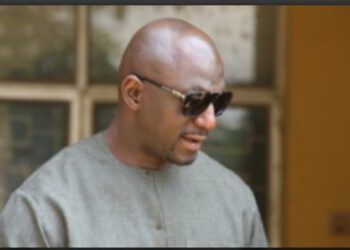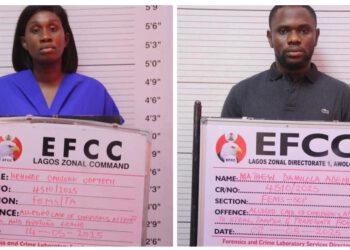By Adebayo Abubakar
As the saying goes, “one good turn deserves another”. So, it is only natural for one to expectedly be under obligation to return favour for favour when someone (a benefactor) once had your back, in line with the idiosyncratic disposition. It was therefore not unheard of when insinuation started making the round that Governor Usman Ododo of Kogi state stood by his benefactor, political godfather, and kinsman, Yahaya Adoza Bello, in the latter’s moment of need when he was declared wanted by the Economic and Financial Crimes Commission (EFCC) shortly after handing over to the former.
Bello, the immediate past governor of Kogi, was declared wanted by the EFCC for alleged crimes that border on money laundering shortly after he left office earlier this year. Having completed his second term in office and handed over to his cousin, he no longer enjoys any immunity from prosecution as provided for in Section 308 of the 1999 constitution. Ododo, it would be recalled, served as Bello’s auditor-general for local government for eight years.
But since January 27 this year when Bello left office, it has been a hide-and-seek game between him and the anti-graft agency that initially invited him over an alleged involvement in a case of “money laundering”, breach of trust, and misappropriation of funds. Bello had failed to honour the invitation. Rather, he sought the Peter Odili formula — getting a perpetual injunction restraining any of the nation’s anti-graft agencies from probing and prosecuting him. The fund is reported to be to the tune of N84, 062,406,089. He was charged alongside his nephew, Ali Bello, and two others — Dauda Sulaiman and Abdulsalam Hudu.
While he was declared wanted, Bello was reportedly holed up in Lugard House, the Kogi state government house in Lokoja, ever since he left office, thus preventing him from being arrested by the EFCC. But, on the 17th of April 2024, the anti-graft agency got wind of Bello’s presence in his Maitama residence in Abuja, the Federal Capital Territory (FCT), and laid siege on the residence, cordoning off the entire vicinity with a barricade from morning until evening.
According to eyewitness accounts, and as reported by the EFCC media team, the former governor’s political godson — the incumbent governor — would arrive later in the evening, armed with the provision of Section 308 of the 1999 constitution — immunity clause (for president, vice-president, governors, and their deputies). He whisked away his political benefactor, preventing the “financial crime police” from effecting the suspect’s arrest.
The same immunity clause also prevented the EFCC from storming Lugard House to pick Bello up for interrogation and subsequently arraign him. The whole thing has now turned into a soap opera of sorts. About a fortnight ago, the former governor reportedly showed up at the EFCC’s headquarters in Abuja in the company of Governor Ododo and some of his supporters but was reportedly asked to go, according to a statement by his media aide, Micheal Ohiare.
It was clear, as someone who had been declared wanted, why he was not seized by the operatives on the ground who were predominantly low-ranking officers. He was reportedly asked to leave because the person (the agency’s chairman, Ọlá Olukoyede) they asked to see was not in the office at the time. Perhaps, because he was in the company of a sitting governor, who is fortified by Section 308 of the 1999 constitution, there was no attempt at arresting him.
Nevertheless, many observers became confused as to why a man who had been declared wanted, with the Interpol put on notice, turned himself in (as contained in his media aide’s press statement) would be asked to leave the premises because their boss was not in his seat. The same commission would later come out again and scream, “Yahaya Bello is not in the EFCC custody! He remains wanted.” Wonders, like they say, shall never cease.
The suspect would then leave the EFCC office for the Kogi government lodge in Asokoro, where another episode of the seemingly unending opera would be unveiled. The EFCC operatives reportedly stormed the area, in a bid to arrest a suspect who’d earlier in the day showed up at their office voluntarily, although with constitutional landmines, as illegal shields around himself in Governor Ododo. There was a reported exchange of sporadic gunshots between the security operatives manning the lodge and the invading forces of the anti-graft agency.
In a nutshell, for the umpteenth time, Governor Usman Ododo returned the favour with Section 308 of the 1999 constitution. This is because, he deliberately put his constitutionally guaranteed immunity from prosecution or arrest in the way, preventing the EFCC from arresting his predecessor and political benefactor. This is in gross violation of the ACJA 2015 (as amended).
Now to the crux of this piece; is the immunity, as provided for in Section 308, transferable? Can it be used to dispense favour, especially preventing a crime suspect from being subjected to the due process of the law? Is it so elastic that it can be made to accommodate beneficiaries like Yahaya Bello, whether or not he is close to any of the public office holders that the section was meant to protect from (frivolous) litigations, arrest, and prosecution for criminal proceedings?
These are some of the questions that keep bothering my church mind, since the former governor of Rivers state and now the minister of FCT, Nyesom Wike, laid the template when he prevented the operatives of the State Security Service (SSS) from arresting a former managing director of the Niger Delta Development Commission (NDDC) – Joy Nunieh – in July 2020. That was the starting point.
I never majored anything in jurisprudence, but I know, like a coin, there are two sides to a law — the letter, and the spirit. In fairness to those who inserted the section into the constitution, the spirit was not to use it to pervert the cause of justice, but to avoid frivolous litigations against the stipulated beneficiaries, to avoid distraction that could affect governance. The letter and spirit of the provision have, unfortunately, been abused. I am, therefore, supporting any advocacy for its abrogation, or amendment. In fact, I am calling for its abrogation altogether.
I wrote a piece on this issue back in April this year wherein I advised the “White Lion” (as Bello is fondly called by his political lackeys) to emulate a former governor of Ekiti state, Ayodele Fayose, “the Oshokomole of Ekiti kingdom”, who after being threatened with post-tenure arrest by the EFCC, took the wind off the sail of the anti-graft agency by voluntarily walking into their office, surrendering himself for arrest/interrogation.
Days before the end of his tenure, he gave the agency a date and time of his arrival. And he made good his promise. In the said piece, I also reminded Bello that he is not the first former governor to be indicted, arrested, and prosecuted. I equally assured him that he won’t be the last either. True to my prediction, while his orchestrated shenanigans went on, his contemporary, former governor of Taraba state, Darius Isaku, had been indicted, arrested, arraigned and granted bail in a matter of days. So, why is “a lion” afraid of “an eagle”?
But by and large, I think an end can be brought to this kind of absurdity as “the immunity clause” becomes “an impunity clause”. The national assembly needs to, as a part of the ongoing attempts at amending the country’s constitution, consider an amendment to the section or an outright abrogation, as it makes a mess of our democracy before the civilised world.
Recently, the Israeli prime minister, Benjamin Netanyahu, was prosecuted for fraud and the State of Israel never got liquidated. So, who then among our public office holders is afraid of prosecution? Who has a skeleton in his closet among the chief security officers of the federal and state governments?
If Ododo is conscious of the enormity of the responsibility he bears as a governor and as an ambassador of the constitution, he won’t, at the altar of personal and parochial interests, be seen to be sacrificing due process of the law, especially as it affects the Administration Criminal Justice Act 2015 (as amended). If he appreciates the need to encourage and enhance the rule of the law, he would distance himself from the Bello shenanigans, much more than he’s currently doing, leading well-orchestrated acts of obstructing the discharge of lawful duties by a law enforcement agency.
Ododo needs to be reminded that Section 308 does not even cover his wife or children, let alone a political associate, or any other person for that matter. Even if he were a twin, his twin brother or sister is not meant to benefit from it. This immunity must not be allowed to degenerate into impunity before the national assembly does something about it. Enough of this nonsense.
Meanwhile, there’s no gainsaying the fact that the people of Kogi are the ones being further short-changed here. Man hour that could better be spent on the core business of governance is spent escorting Bello up and down. A state governor now becomes the official bouncer of criminal suspects. State resources are also spent accommodating the alleged fugitive in the Government House Lokoja.
Nobody can argue with me the fact that the fuelling of the fleet of cars (most of which are fuel-guzzling SUVs) with which they went about town, from the EFCC office to the state government’s lodge in Asokoro is also not on the pauperised people of Kogi. The ex-governor should be man enough to be left to bear his cross. After all, he is a “lion”, a white one for that matter. He shouldn’t be scared of an ordinary eagle.
Ododo should, therefore stop wasting the precious time, for which Kogites pay heavily, on shielding Bello from the due process of the law. I hereby call on the national assembly to take a critical look at the obnoxious section (308), with a view to either abrogating it or reviewing it such that it would no longer be easily amenable to this kind of abuse.





















